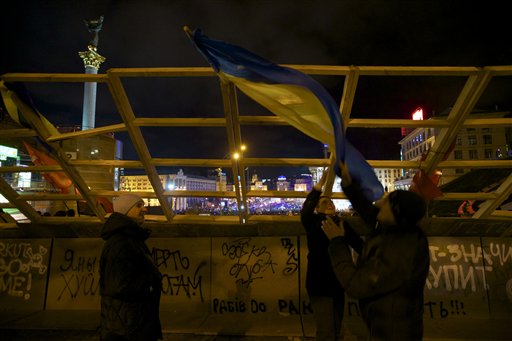(AP) No-confidence vote in Ukraine fails
By MARIA DANILOVA
Associated Press
KIEV, Ukraine
Ukraine’s opposition has failed in its attempt to force out the government with a no-confidence vote in parliament.
The failure leaves Ukraine’s political tensions unresolved, with opposition demonstrators still angered by the president’s shelving of an agreement with the European Union and by police violence against protesters denouncing that decision.
The dispute has brought crowds as big as 300,000 to the streets of Kiev, the largest outpouring of public anger since the 2004 Orange Revolution.
THIS IS A BREAKING NEWS UPDATE. Check back soon for further information. AP’s earlier story is below.
Ukraine’s parliament on Tuesday opened a high-tension session in which the opposition aims to put forward a vote of no-confidence in the government in the wake of both the president’s shelving an agreement with the European Union and police violence against demonstrators protesting that decision.
Inside the parliament, opposition members shouted “shame” and “revolution” as pro-government lawmakers spoke, while opposition speakers drew boos and jeers. Outside the building, thousands of demonstrators gathered, calling for the government’s dismissal.
After members of the various factions speak, the parliament will consider whether to put an opposition-backed no-confidence motion to a vote. If it does come to a vote, it is unclear if the opposition has enough support to pass it. Several lawmakers from the governing party have defected.
President Viktor Yanukovych’s recent decision to shelve the long-anticipated agreement to deepen economic and political ties with the EU and to seek closer cooperation with Russia instead brought thousands of protesters to the streets. After police brutally swept aside a protest gathering early Saturday, anger spiked and some 300,000 protesters came out on Sunday.
The protests are the largest since the weeks of mass demonstrations in 2004, called the Orange Revolution, which also were directed against Yanukovych as the nominal winner of a fraud-plagued presidential election. Those protests forced a revote, which Yanukovych lost; he narrowly won the office in 2010, beating Orange Revolution icon Yulia Tymoshenko.
Russian President Vladimir Putin, who strongly opposed the EU deal, has denounced the opposition protests in Kiev as “pogroms.”
On Monday, Yanukovych called European Commission President Jose Manuel Barroso and asked to renew negotiations on signing the association agreement. He also said in an interview with Ukraine’s main television channels that he remains committed to European integration, but would like to negotiate better terms for the fragile Ukrainian economy.
Yanukovych urged the opposition for calm and dialogue with the government. But his call fell flat with opposition leaders who were hoping to summon enough parliamentary votes Tuesday to oust the cabinet led by Yanukovych’s loyal supporter, Prime Minister Mykola Azarov, and force an early presidential vote.
It was unclear whether the opposition could muster the 226 votes it needs in the 450-seat parliament.
The opposition controls about 170 seats, but independents hold 35 more and the governing Party of Regions was shedding support. At least three of its lawmakers quit in protest and one of them, Inna Bohoslovska, previously a vocal government supporter, called on other legislators to leave the party. A top Agriculture Ministry official also resigned Monday.
Opinion surveys conducted before the protests showed about 45 percent of Ukrainians support closer integration with the EU, with a third or less favoring closer ties with Russia. But the protests, and the police violence, appear to have unleashed anger against the government and tipped the balance more strongly in favor of integration with the EU.
The opposition also was getting support from Ukraine’s main television channels, which are owned by the country’s wealthiest businessmen. Instead of largely toeing the government line, the channels have begun to give a greater platform to the protesters.
Demonstrators on Tuesday continued blocking the Cabinet of Ministers building, while thousands were rallying on Independence Square, which was turned into a giant tent camp cordoned off by barricades made of metal bars and wooden planks. Hundreds of others held ground inside Kiev city hall, where some protesters slept on the floor, while others lined up to receive hot tea, sandwiches and other food brought in by Kiev residents. Other volunteers sorted through piles of donated warm clothes and medicines.

COMMENTS
Please let us know if you're having issues with commenting.